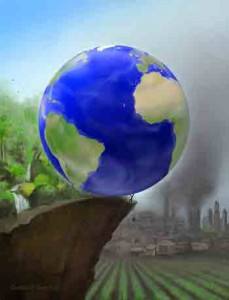The term “tipping point” is used in a number of disciplines with the same basic meaning but slight variations. Generally it means a turning point, threshold, a moment in time, an event or “critical point in a situation, process, or system beyond which a significant and often unstoppable effect or change takes place.” From climatology specifically, and global climate studies generally, we know that the earth has been slowly, gradually warming over a hundred years and more, but there are or may be turning points when greenhouse gases have built up so that the earth’s warming will have irreversible and drastic adverse effects. Such irreversible effects include the melting of the North Pole’s sea ice, Greenland’s glaciers and the Antarctic ice sheets, resulting in rising sea levels; the acidification of the oceans, endangering much marine life; the destruction of the Amazon rain forest, with dramatic increases in carbon dioxide emissions; a melting of the permafrost with the release of significant volumes of methane and further global warming.
Image: Cheng (Lily) Li
One of the dangers, and uncertainties, of tipping points is that we do not always know we passed one. The drastic, irreversible effects are known only after they are observed, after they happen, even though the tipping point may have been passed decades before. For example, we could release GHGs to such a level in 2020 that in 50 years those GHGs will cause a drastic melting of sea ice and sea level rise and we will not be able to stop the effect. We passed the point of no return in 2020 but did not know it until the impact was felt 50 years later.
Some further ideas to explore on Tipping Points
Explore the relationship between tipping points and the precautionary principle.
Are there any tipping points for climate change that already have been passed? If so, identify them, and determine when each tipping point was passed.
For any tipping point that has passed already, were there any warnings or signals about the tipping point before it was passed. If so, who provided the warning or signal and why was it ignored.
Sources:
Merriam-Webster Dictionary, “Tipping Point,” www.merriam-webster.com/dictionary/tipping+point?show=0&t=1363726365
“Tipping Points and Abrupt Change” climatecommunication.org/climate/tipping-points/
“Climate ‘Tipping Points’ May Arrive Without Warning, Says Top Forecaster,” Science Daily www.sciencedaily.com/releases/2010/02/100209191445.htm
Live Science, “Countdown: Earth in the Balance: 7 Crucial Tipping Points” www.livescience.com/13032-earth-7-tipping-points-climate-change.html



No comments yet, add your own below